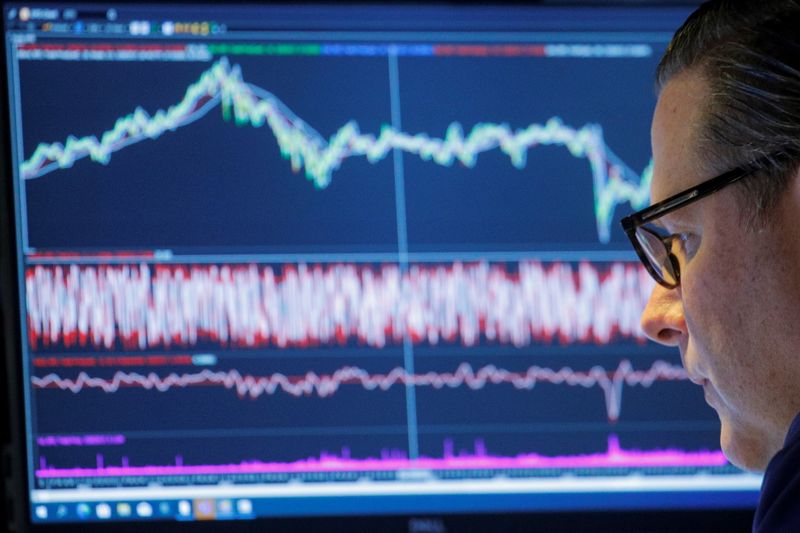By Geoffrey Smith
Investing.com -- The Federal Reserve begins a two-day meeting which is expected to end in half-point rise in U.S. interest rates. Australia's central bank jumped the gun overnight, with a 25 basis point hike of its own. The Labor Department publishes the monthly Job Openings survey, while there's another slew of earnings from the likes of Pfizer, DuPont and, after the bell, AMD and Airbnb. Beijing tightens its lockdown and oil prices give up some of Monday's gains while oil companies take it in turns to release the best earnings in years, at least in underlying terms. Here's what you need to know in financial markets on Tuesday, 3rd May.
1. RBA jumps the gun as Fed starts two-day huddle
The dollar and U.S. bond yields eased slightly as the market settled down to wait for the outcome of the Federal Reserve’s two-day meeting, which starts later Tuesday.
Expectations for a half-point rise in the fed funds target range to 0.75-1.00% are all but universal, which means that the key variable coming out of the meeting will be the unwinding of two years of bond purchases. Various Fed officials have called for an early start to active sales from the Fed’s bond portfolio to keep the yield curve slope positive.
It’s a busy week for central banks in the Anglosphere, with the Bank of England expected to give its own signal on quantitative tightening on Thursday. The Reserve Bank of Australia, meanwhile, unexpectedly raised its key rate by 25 basis points overnight, pushing the Australian dollar up 0.7%. The Aussie is still down some 6% in the last month.
2. JOLTS survey, factory orders due
The Labor Department will publish the first of three key labor market indicators due this week at 10 AM, with the monthly Job Openings and Labor Turnover Survey. Recent surveys have shown vacancies trending near record high levels amid widespread complaints of skills shortages by companies. High job turnover is also associated with higher earnings, given that many people take advantage of such shifts to make a step change in their income.
Factory orders and durable goods orders excluding defense for March are also due at 10 AM.
Data releases from the Eurozone overnight showed producer prices running at a record high of nearly 37% year-on-year in March, while the improvement in the German labor market slowed in April.
3. Stocks steady ahead of earnings flood; AMD, Starbucks, and Airbnb to report late
Another slew of earnings will be released into a still jittery market that only recouped half of its Friday losses on Monday. Stocks are set to open flat to lower later, despite some impressive performances by Monday’s late reporters.
NXP (NASDAQ:NXPI), Avis (NASDAQ:CAR), and Clorox (NYSE:CLX) both beat earnings forecasts handsomely, as did pipeline company Williams (NYSE:WMB). Both conspicuously ruled big increases in production in the short term, choosing instead to use their improved cash flow to strengthen their balance sheets.
By 6:20 AM ET, Dow Jones futures were down 26 points, or less than 0.1%, while S&P 500 futures were down 0.1%, and Nasdaq 100 futures were down 0.2%.
Early reporters on Tuesday include pharma giants Pfizer (NYSE:PFE) and Biogen (NASDAQ:BIIB), industry facing bellwethers Rockwell (NYSE:ROK) and DuPont (NYSE:DD), and financial giant S&P Global (NYSE:SPGI) (for the first time after consolidating IHS Markit). AMD (NASDAQ:AMD), Starbucks (NASDAQ:SBUX), and Airbnb (NASDAQ:ABNB) lead the roster of late reporters, along with AIG (NYSE:AIG) and Caesars (NASDAQ:CZR).
4. Beijing lockdown tightens; Ma scare hits Alibaba
The lockdown in China’s capital is getting gradually tighter. Beijing asked residents not to leave the city unless necessary and delayed the reopening of schools that was due on Thursday after the three-day holiday.
The South China Morning Post reported incidents of the authorities in neighboring Hebei province bolting doors to prevent people leaving their homes, in fresh evidence of the human strains caused by the official Zero Covid policy (reaffirmed last week by President Xi Jinping personally).
In other Chinese news overnight, Alibaba (NYSE:BABA) shares in Hong Kong slumped 9% on reports that police in Hangzhou, home to the e-commerce giant, had arrested an Internet executive named Ma. The stock rebounded when it transpired that it wasn’t Alibaba founder Jack Ma, but the incident illustrates the fragility of market sentiment.
5. Oil gives up gains ahead of API; BP (LON:BP) posts big loss on Russia exit but expands buyback
Crude oil consolidated after rising on Monday in anticipation of another meeting of largely empty promises by OPEC and its allies to raise output.
BP (NYSE:BP) CEO Bernard Looney said he expected the shortfall of Russian crude to double to 2 million barrels a day as a result of the cumulative impact of western sanctions, which are set to be tightened later this week. Those hoping for a big increase in U.S. shale output to compensate were disappointed late on Monday by shale oil producers Diamondback (NASDAQ:FANG) and Devon Energy (NYSE:DVN), which repeated their commitment to balance sheet repair.
BP, meanwhile, posted a $25 billon loss on writing down its Russian business, but increased its buyback as underlying cash flow improved sharply.
By 6:30 AM ET, U.S. crude futures were down 1.1% at $104.06 a barrel, while Brent was down 1.1% at $106.41 a barrel. The American Petroleum Institute’s weekly inventory data are due at 4:30 PM ET.
